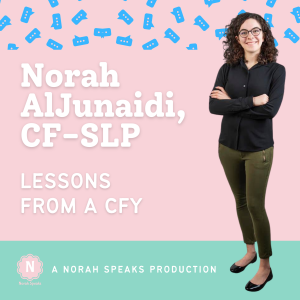Lessons from a CFY Week 19 and 20
Happy almost 2022, folks! It’s hard to believe we made it this far. This edition of lessons from a CFY rounds out my fifth month as a CF- four to go.

Lesson 19.1: Self-Doubt
This lesson is inspired by a comment from a fellow SLP-CF on Tiktok. They expressed that they often modify their plans of care, but experience a lot of doubt doing so. I can only imagine that this is common among both seasoned SLPs and CFYs. Being early career professionals, having doubts is both normal and expected. What matters is not letting those doubts win. First of all, it’s important to be mindful and acknowledge the presence of any doubts. Next, think about why you are having these doubts. Does it come from a lack of self-confidence? Does it come from others’ opinions? Something else? Knowing where doubts come from can help combat them. Lastly, look at the facts. What facts show that these doubts may be true, if any? This advice comes from my therapists when any anxious thoughts arise. Here’s an example:
If you’re doubting adding a goal to your client’s plan of care, say you wanted to a fluency goal that is oriented to avoidance-reduction versus fluent speech, think of you WHY for doing it, not the WHY NOTS. The why can be in the form of data that shows fluency strategies were not effective, not the client’s preference, or did not make a positive impact emotional according to the Overall Assessment of the Speaker’s Experience of Stuttering (OASES™).
All these methods can show concrete data and qualitative evidence that can support your goal change. There is also research that backs the efficacy of this strategy. These can be points to prepare to back up your decision to yourself or others. If you’re having doubts, think about your why and give yourself proof of why you made your decision! You might surprise yourself and increase your confidence!
Lesson 20.1: When Client Relationships End
Something I think isn’t as well addressed in graduate school is when you stop seeing a client. This could be because of discharge, client stopping treatment, relocation, etc. At the private practice I’m at, some families will stop abruptly for a variety of understandable reasoning and it can feel like a lack of closure. In these instances, I like to follow up and thank the family for working with me, compliment the child or say you enjoyed working with them, and if there were any referrals to make, that will be a good thing to include in your email or call. For one client, I gave contact information for a tutor. I don’t know what happened after that, but I gave information that could help the family, if they chose to use it. It can feel awkward with a lack of closure, but it’s important to do all you can for the client even if the ending isn’t as we imagined. The therapeutic process is rarely linear, and there are a lot of extenuating factors that can affect consistency of treatment in the real world, especially in times of COVID. It can hinder progress. It’s important o stress to families the importance of consistency and provide a degree of flexibility with scheduling to increase that consistency. Additionally, remind the families of the value the therapy provides and why it’s essential. Do all you can for a family, and even if it doesn’t end the way you expect, you still know you gave your all and helped the client.
Thanks for reading this edition of lessons from a CFY! Click here to read more!

